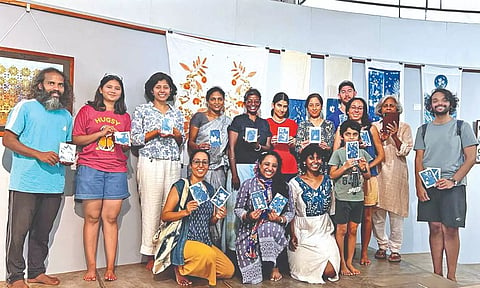Architect embraces environment through eco-prints
CHENNAI: After going through a few personal struggles, Kalaivani, an architect, wanted to explore something new and unique as she was not satisfied with her profession. That is when she discovered cyanotype printing, a process where photosensitive ink is applied to the material and kept under the sun.
“I stayed in Goa for more than three years. It was a major turning point in my life, which led me to take up this path. I attended a few cyanotype printing workshops and found the process interesting,” shares Kalaivani, founder of Studio Yakshi.
“I was fully satisfied with this because the process takes place in a dark room and there is less interaction with people, unlike how it was in my previous job. Initially, I started printing on paper. Later, I wanted to do it on fabric, as it can be used for clothes, bags, etc. that are useful,” she says. Using cyanotype technique, she started taking prints of different types of leaves on fabrics. However, large-scale production is not possible because it involves a photographic process. “After one year of doing cyanotype printing on fabrics, I wanted to increase the production scale,” adds Kalaivani.
But she was not very keen on using artificial dyes. That’s when she got introduced to eco-printing, a technique in which leaves, plants and flowers are bundled inside a cloth and steamed to release their natural dye. This results in plant materials leaving an impression of their shape, colour and texture on the fabric.
Two years ago, Kalaivani started Studio Yakshi in Auroville though she has been doing natural prints for more than six years. “I realised a connection with the environment after getting to know about eco-prints. That’s when I started spreading awareness about the importance of this technique and providing vocational training to people, including school students,” she says.
Kalaivani adds that not many people like natural prints thinking that it looks dirty and hopes they realise the uniqueness of such fabrics soon. According to her, people should start accepting that fabrics will fade in some time for the sake of the environment. Eco-prints will fade if used too many times, but people can apply new colour on their own and reuse them.
The common patterns which Studio Yakshi use are everything surrounding humans like leaves, plants, flowers, fish, and butterflies among others. “This will give a connection and people can relate more to each other as well as the environment. It will also make folks curious about what is around them,” she remarks. One of the collections which she considers a personal favourite is the one with gloriosa superba.
Apart from this, Kalaivani along with her associate Dhavapriya, makes cyanotype fridge magnets, purses, lamp shades, etc. “We also work with village action groups. Our main focus is to create a safe space for women to support each other and make good investments in things related to the environment,” says Kalaivani.
Recently, Kalaivani and Dhavapriya organised a pop-up in Chennai, introducing their works to people here. Studio Yakshi is planning to come up with unisex clothing line and new geometric patterns.

